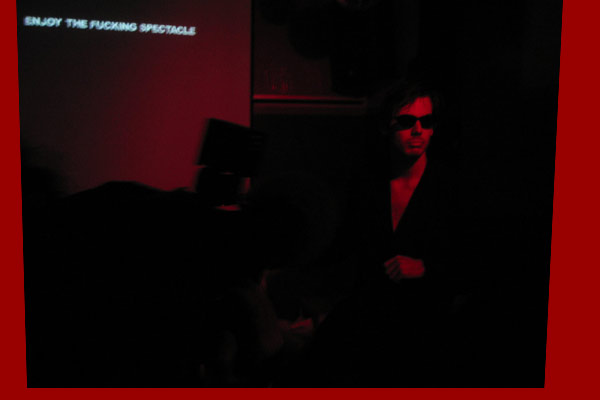

Mattin (b. 1977) from Basque country is a laptop musician, who has quickly gained a reputation as an excellent improviser. In addition to his solo works, he performs actively with both electronic musicians and veteran players of acoustic instruments like Radu Malfatti and Eddie Prévost, with whom his elegantly simple and powerful feedback sound constrasts beautifully. Mattin’s playing style often resembles the approach of the more radical electroacoustic improvisers, like when he scrapes and saws the case of his laptop with a small metal file, or as he put in an e-mail exchange: “I still sometimes physically attack this old computer. And sometimes do not turn it on and other times play just the hard drive noise, or the cd writer. Or sometimes do not open the screen or sometimes play just the earth hum. Endless possibilities with such a great machine.”
Mattin, who has studied visual arts and art history in London, is also a filmmaker and an astute theorist. He has written, for example, on the political dimensions of free improvisation: “There is a necessity to break with any previous understanding of music. The meta-musician is not just a player/composer/listener at the same time, he or she is a revolutionary and consumer of the other players' revolution. Is this not too much to ask of a human being?” And elsewhere: “If the musician is able to develop a personal approach to music making, this does not happen in isolation, but collectively, among other musicians and listeners. Improvised music generates meaning from the residue that marketed music tries to exclude, not to be recycled for future use, but momentarily to destroy the hierarchies of value that structure the physical act of making music.”
Mattin’s solo concerts are characterised by a mastery of contrast between furious noise and silence. In the same “dialectical” spirit, his films are silent. His latest short film Bilbo Bukatua, which will be screened before his concert in Kiasma, deals with the gentrification of Bilbao. As a filmmaker Mattin continues the tradition of 1960s structuralism in his own way, and has commented on its new emergence as a topic of interest in the art world in the following way: “I hope sentimentality does not come into this discussion dealing with film. Or that artists do not use it in a fetishistic way as some artists do now (ex. Tacita Dean) but rather to bring some critical awareness to the moving image. What I would like to propose is that the materiality of film can be a tool to de-territorialise the hegemony of the digital moving image era. Looking at the new through the old can be a way to resist current ideologies.”
Mattin in the Kiasma Theatre on Friday, November 19th at 19.00.